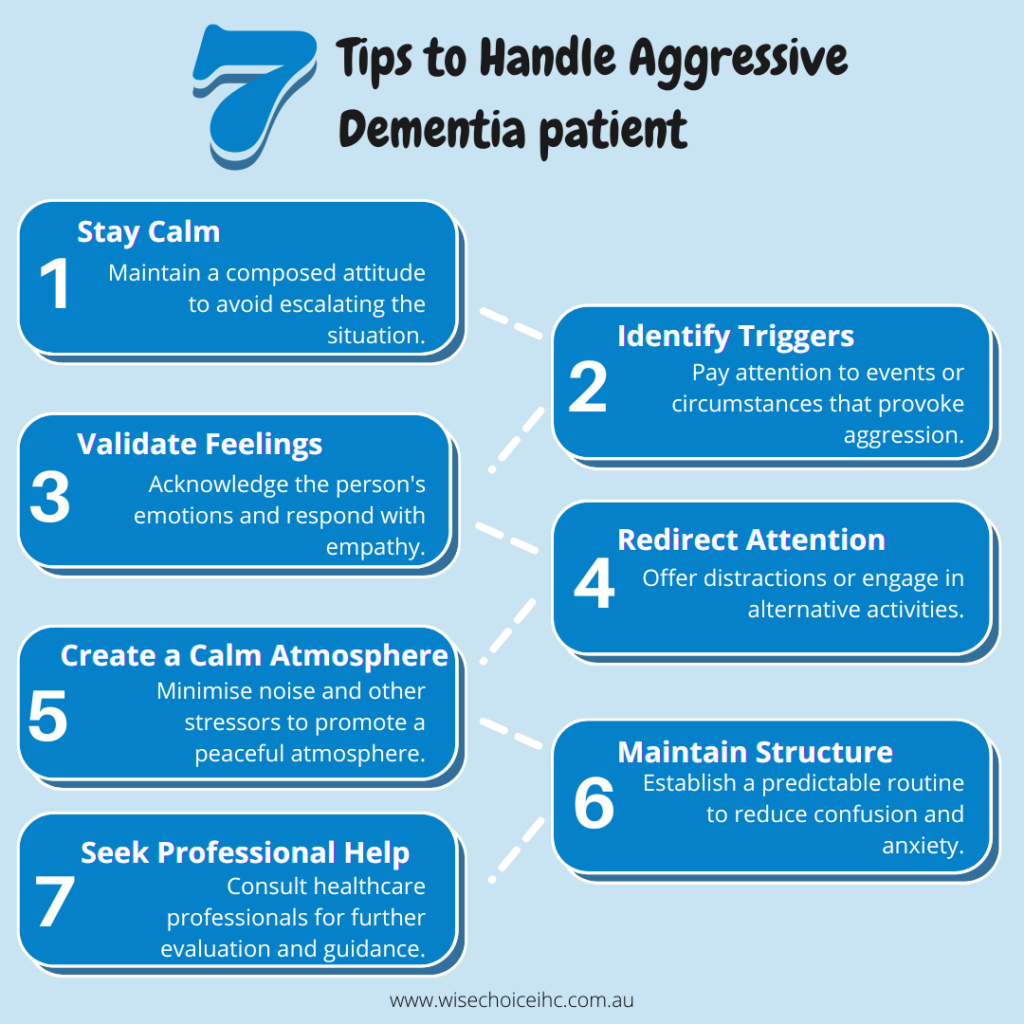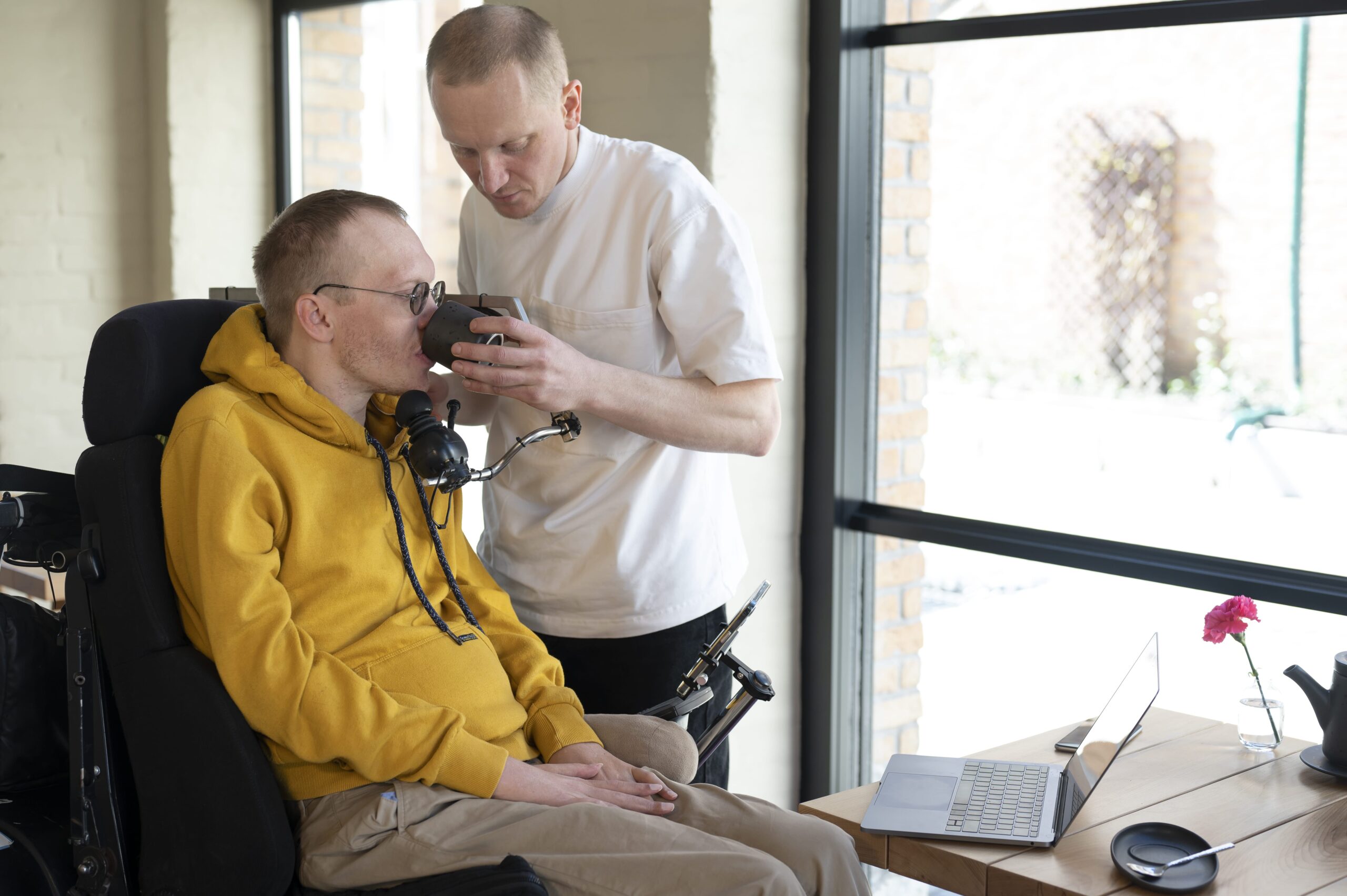Have you ever felt helpless when a loved one with dementia lashes out? Dementia can bring a whole new set of challenges, and aggression is a big one. It can leave you confused, frustrated, and unsure how to react.
Dementia patient feels agitated, which means they are restless, pacing, or have heightened levels of anxiety and distress. Aggression is a higher level of agitation, which is a more forceful behavior, like lashing out verbally or even physically. To manage a dementia care refusal patient who displays aggression, there are various approaches, particularly when they refuse care, necessitating a compassionate and strategic approach to ensure their safety and well-being.
Understanding the root causes of this behavior is crucial for providing adequate care and support. To avoid mistakes in dementia care, you must be attentive, patient, empathetic, and knowledgeable about the individual’s needs and preferences. Simply ignoring or reacting with frustration can escalate the situation. As dementia progresses, changes in the brain can lead to alterations in mood, perception, and communication, often resulting in aggressive outbursts.
The first step in handling dementia patients always involves being aware of WHY dementia patients become agitated or aggressive. Read further to explore the underlying causes of aggression in people with dementia.

Why do Dementia People become Aggressive?
Aggressive behaviour in a person with dementia can have various causes and triggers. While each individual may respond differently, there are some common factors that can contribute to aggression in dementia patients.
1. Pain or discomfort: Unaddressed physical discomfort or pain can lead to frustration, irritability and ultimately aggressive behaviour in dementia patients. It’s essential to monitor and manage any potential sources of pain, such as injuries, infections, or chronic conditions.
2. Communication difficulties: Dementia can impair a person’s ability to effectively communicate their needs or frustrations. When individuals with dementia struggle to express themselves or feel misunderstood, they may become frustrated and resort to aggression as a means of communication.
3. Environmental factors: Environmental factors like excessive noise, overcrowding, unfamiliar surroundings, or changes in routine can contribute to agitation and aggressive behavior. Providing a calm and structured environment with familiar objects and engaging activities with dementia patients can help reduce these triggers.
4. Fear and confusion: Dementia can cause individuals to experience fear, confusion and anxiety. When they feel overwhelmed or unable to comprehend their surroundings, they may respond with aggression as a defense mechanism.
5. Unmet needs: Basic unmet needs, such as hunger, thirst, fatigue, or the need for personal hygiene, can trigger frustration and aggression in dementia patients. Ensuring that these needs are consistently met can help alleviate aggressive outbursts.
6. Medication side effects: Certain medications prescribed for dementia or other coexisting conditions can have side effects that contribute to aggression. It’s important to review and monitor medication regimens in collaboration with healthcare professionals to identify any potential culprits.
7. Past experiences or trauma: Previous experiences of trauma or distress, such as abuse or neglect, can resurface in the behaviour of dementia patients. These unresolved emotions can manifest as aggression.
8. Loss of independence: The progressive nature of dementia often results in a loss of independence and a sense of control. This loss can lead to frustration and aggression as individuals struggle to cope with their changing abilities and increasing reliance on others.
How does dementia affect the brain and lead to agitation and aggression?
Dementia is characterised by progressive brain damage, typically involving areas responsible for memory, cognition, emotion and behaviour. As the disease advances, it results:
- Neurological Damage: Dementia leads to the loss of neurons and disruption of neural networks, impacting cognitive function, emotional regulation and impulse control.
- Neurochemical Changes: Imbalances in neurotransmitters such as serotonin and dopamine can affect mood and behaviour, potentially contributing to aggression.
- Structural Changes: Brain atrophy and damage to regions involved in emotion regulation, such as the frontal lobe, may impair the ability to modulate emotional responses, increasing the likelihood of aggression.
Seeking solutions for dementia-related aggression?
Creating a calmer and more manageable environment, we offer exceptional dementia care services designed to improve your loved one’s well-being. Schedule a consultation today.
How to Manage Aggressive Behaviour in Dementia Patients?
When dealing with aggression in dementia, it’s essential to approach the situation with empathy, patience and effective strategies. Here are some tips to manage and reduce agitation or aggression:
De-escalation Techniques:
- Stay Calm and Validate Feelings: It’s important to remain calm and avoid getting defensive or angry. Acknowledge the person’s emotions and validate their feelings. Using phrases like “I see you’re feeling frustrated” or “It sounds like you’re upset” can help them feel heard.
- Remove Triggers: If possible, identify and remove any triggers that might be causing the aggression. This could involve lowering the lights, turning off loud noises, or offering a familiar object for comfort.
- Speak Slowly and Gently: Use simple, clear language and avoid shouting or arguing. Maintain eye contact and speak in a soothing tone. For example, instead of saying, “Go to the bathroom, brush your teeth and then put on your pyjamas,” you can say, “Let’s go brush your teeth now.”
- Offer Choices: When possible, offer the person choices to regain some sense of control. This could be as simple as choosing between two shirts to wear.
- Provide Distractions: Sometimes, redirection can be a helpful strategy. Offering dementia-friendly hobbies and activities like familiar music or a comforting object to distract them from the situation.
- Respect Personal Space: If the person seems agitated, provide them with some space but remain within sight to ensure safety. Don’t restrain them unless absolutely necessary to prevent injury.

Creating a Supportive Environment:
- Maintain a Routine: People with dementia thrive on predictability. Establishing a daily routine with consistent mealtimes, activities and sleep schedules can provide a sense of security and reduce anxiety.
- Focus on Positive Reinforcement: Praise and celebrate successes, no matter how small. This positive reinforcement can help encourage cooperation and reduce frustration.
- Ensure Physical Comfort: Address any underlying medical issues that might be causing pain or discomfort. Make sure the environment is comfortable, with proper lighting and temperature.
- Seek Professional Help: If aggressive behaviour is persistent or difficult to manage, consulting a healthcare professional or dementia specialist can be beneficial. They can provide additional guidance and support.
Also Read: 20 Tips and Ideas to keep dementia patients engaged
What are three things to never do to people with dementia?
While you deal with aggressive dementia patients, you should never do:
- Never argue with them: Arguing with someone with dementia is often counterproductive and can escalate conflict. Instead, try to redirect the conversation or calmly steer it toward a more positive topic.
- Never correcting them: Correcting someone with dementia can lead to frustration and agitation. Instead of insisting on factual accuracy, focus on empathetic listening and validating their feelings or experiences.
- Never ask them to recall: Putting pressure on individuals with dementia to recall specific memories can be distressing, especially if they’re unable to do so. Instead, focus on creating enjoyable experiences in the present moment and engaging in activities that promote connection and well-being.
When should someone with dementia go into a care home?
When to move a loved one with dementia into a care facility is a very complex decision that is influenced by several variables. Here are some signs that a care home might be the right decision:
- Frequent falls or injuries
- Difficulty managing medications
- Poor hygiene and self-care
- Wandering and getting lost
- Increased confusion and disorientation
- Verbal or physical aggression that becomes difficult to manage
- Family caregiver burnout or inability to cope.
Why choose Wise Choice for Dementia Care Service?
When it comes to dementia care, choosing the right provider is paramount. At Wise Choice, we prioritise enriching the lives of those with dementia through compassionate care. Whether you seek assistance within the comfort of your home, the assurance of an aged care facility, or the versatility of community care services, we establish a secure and stimulating environment that fosters overall well-being.
Our team of caregivers is specially trained to understand the unique needs of dementia patients. We offer personalised care plans to manage challenging dementia behaviours. Contact us today to discover how we can provide dementia care solutions that promote comfort, dignity and quality of life for your loved one.


